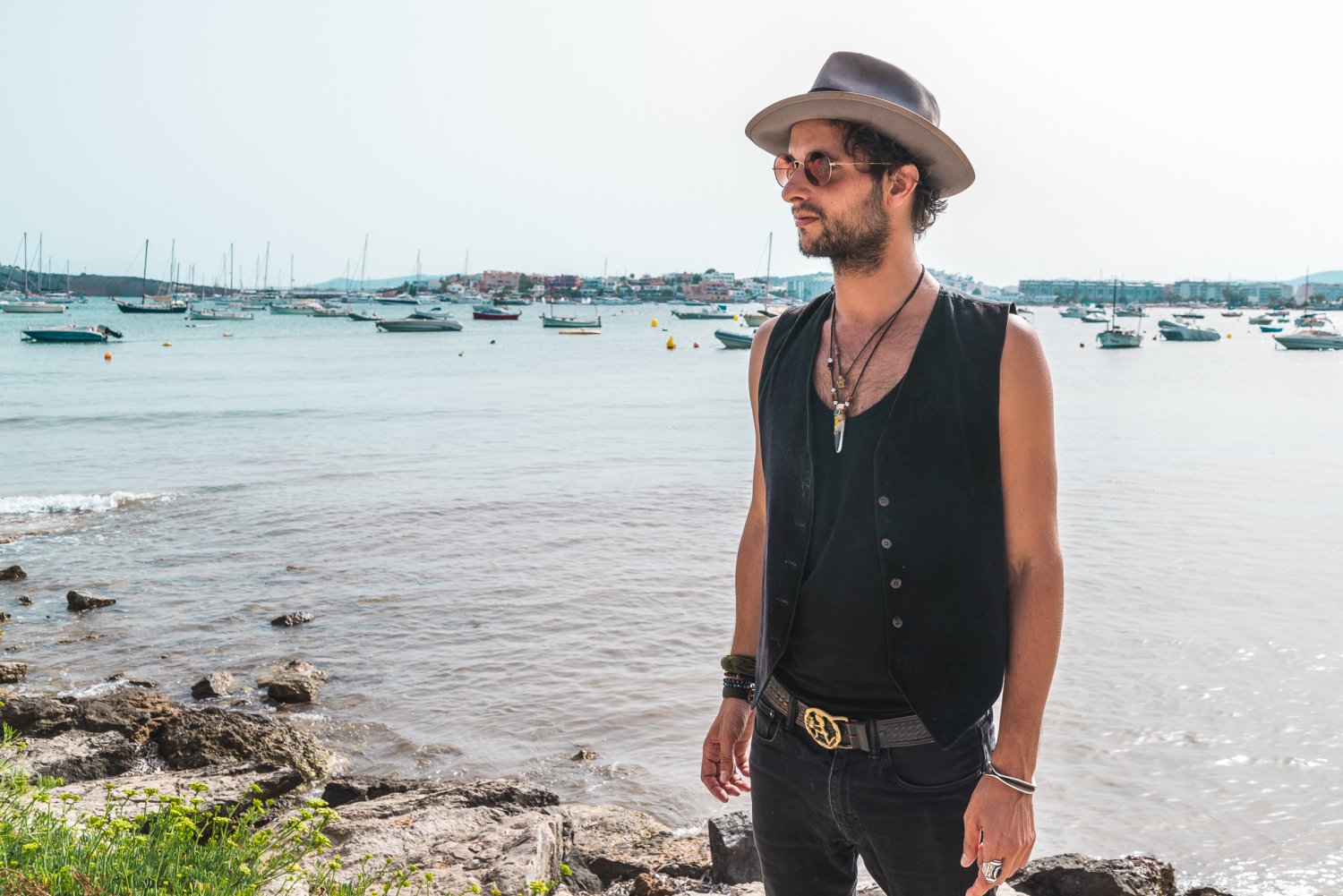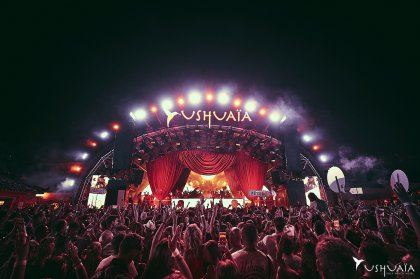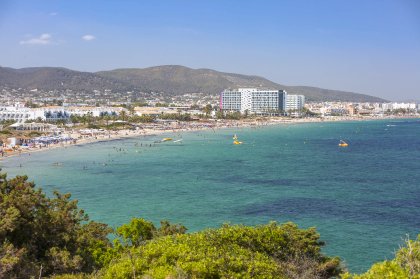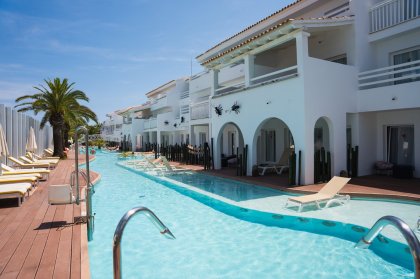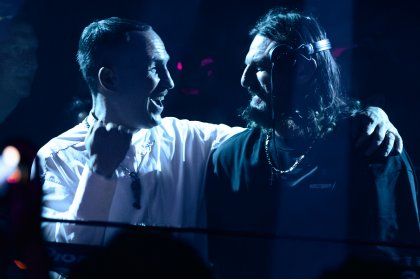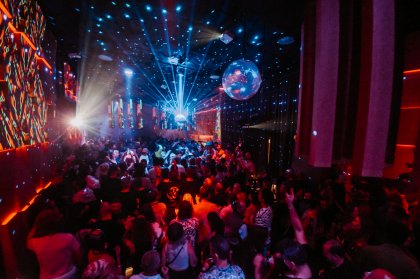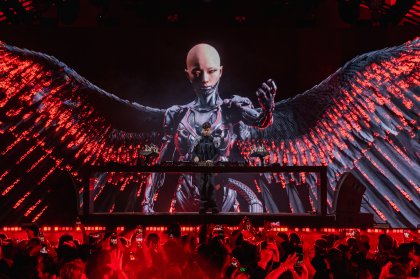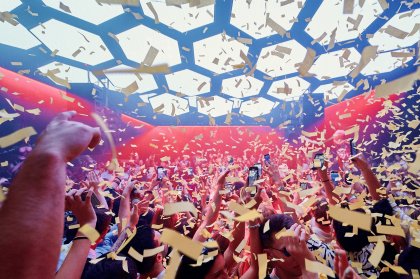Spontaneous Enlightenment - that is the meaning of the Buddhist word from which Djordje Petrovic borrows his stage name, Satori. The ideology foretells that Buddha himself was said to have experienced satori fives times until he achieved nirvana.
The moniker has been aptly chosen since experiencing Satori live is an uplifting, spiritual journey that will put you in a trance. It is an experience like a psychedelic-fuelled, shaman-led, nomadic voyage across the desert.
If we had to pigeon-hole him, we would be inclined to say that he meanders between downtempo folktronica and deep house. Ethnic vocal samples and native instruments dot his productions. However, Satori is not an artist who conforms to stereotypes.
He is a performer who dares to walk the untrodden path, somebody you have to have complete faith in to lead you astray. He possesses a snake charmer mastery. Be prepared to be hypnotised, awed and taken on a musical journey.
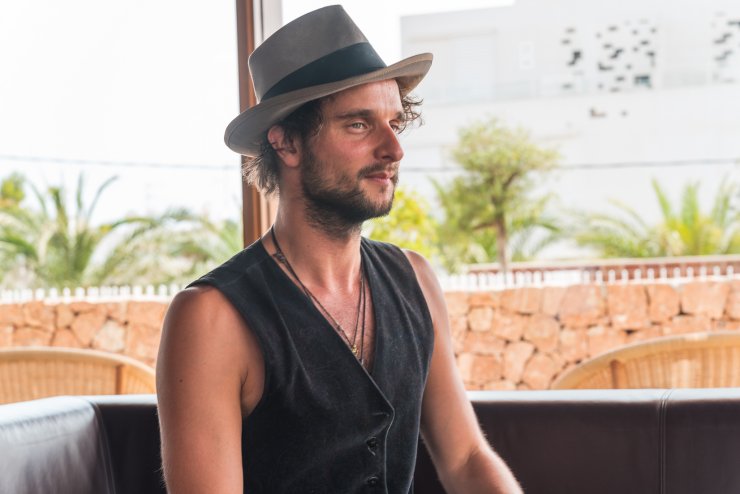
When put in such a situation, intrepid music fans are encouraged to dive in with both feet and discover uncharted territory.
He is even on record as saying that he takes a "worldly approach" to music, aiming to break boundaries and combine cultures.
Dressed in a trilby, waistcoat, fashion house jeans and buckled belt, Satori arrived ready for his gig later in the afternoon. He looked ready to spring into action at any moment.
Not knowing where our conversation would head, we sat down with the man before his appearance at DYSTOPIA to learn a little more about this musical enigma.
the organic musician
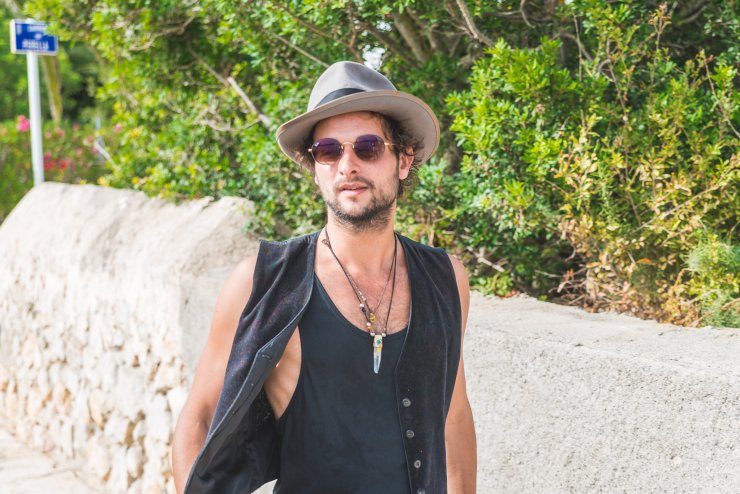
In an industry heavily focused on technology, machines and industrial man-made environments, Satori could not be a more refreshing tonic. He is openly inspired by his surroundings and nature. Needless to say, Ibiza itself is a constant source of inspiration.
"When I don't play, I go to the north of Ibiza on a scooter. With a scooter, you're faster than going in a car actually. In the north, you have so many of these smaller beaches and great restaurants.
When I'm in the north, I'm always surprised that I can be on a beach with three other people. You don't realise that it's peak season on Ibiza. You don't see anyone. I do a lot of hiking there. For me, that's the beauty of Ibiza. It feels really free.
Actually, when I left two weeks ago, I realised that you feel free here because on Ibiza, you can basically be whatever you want to be. If you want to be a raver, you can party until morning and go to the after-party. You know?
If you want to do yoga, you can do yoga. If you want to eat healthy food straight from the farm, there are places for that. I can be running or doing a workout, but I can also party. This is what I like about Ibiza: it has so much colour and so much to offer."

He continues, "When you're on the plane flying over from Amsterdam, you rarely see the typical ravers - not everybody is dressed in black with a snapback on. You see families with kids, you see old people. Yes, you see some ravers, too.
When you're on the plane, you realise all that Ibiza has to offer. Some of them camp. Some go to yoga. Some go partying for five days straight. Ibiza is very diverse, and I feel really free here."
Instead of looking to the mid-west United States or Berlin for his inspiration, Satori looked elsewhere: to the Balkan region or to Paris, where his forthcoming material was recorded. His first album - last year's Maktub on Damian Lazarus' Crosstown Rebels - was inspired by 1001 Arabian Nights.
"I use synthesizers, of course, but I use them to play samples or things that I recorded, so it is not a synthetic sound. I realised two or three years ago, as I brought all these synths on stage - the Korg, the Juno or whatever - that everybody has these synths.
You can go to any studio - everybody owns one. So when you go on stage, you have the sound that everybody else has. For some sounds, it doesn't matter. Some sounds are so iconic, they have a beauty to them. It's cool.
But a lot of the time, I got kind of bored with it. I realised that when I make my own sound by recording it, sampling it and running it through Ableton and playing the keys, the crowd would hear a sound that nobody else had. Super personal, super unique - it's mine.
So this year I just decided to drop all the synths. Now there's just a Nord Lead stage piano on the synth. I don't even use the sound, but I use the midi that goes back into it. Everything I play, I wrote myself. It's recorded by me. It's like a fingerprint - super personal."
The conversation turned to his new mini-album, tentatively dropping sometime in autumn we're assured.
"All of the tracks were written in Paris as well as all being inspired by paintings. For me, it's the first time that I approached my productions in a different way. I started with an intention before writing music.
I used to just go to the studio, jam around and make a nice beat. Try to create a cool break and you have a track that works. It's nice. Everybody likes it. Nothing wrong with that. But I think that, perhaps because I'm older, I wanted to produce more serious productions.
This is the first album that each track has a very strong backstory. Each one has very strong content behind it."
Spontaneity vs Rehearsal

Considering how Satori gets highly animated and evidently jams on stage, we were interested to learn the split of improv and rehearsal in his show.
"I was recently watching a documentary on a very famous Dutch stand-up comedian. It was so similar - what he was doing and what I was doing. He said in the documentary that there's a lot of improvisation, but when he loses the crowd - when he sees that he fucked up and nobody's laughing - he has his go-to jokes, the ones he knows everybody will laugh at.
In a way, that's also my approach. A lot of my stuff is also rehearsed in a way that, if I lose the crowd, I know that if I go to this part I would win their trust back.
Once I have their trust, I also like to go on an adventure with them and then it's fully improvised. It's then that I don't know what I'm doing and they don't know what I'm doing - and that's the beauty I think."
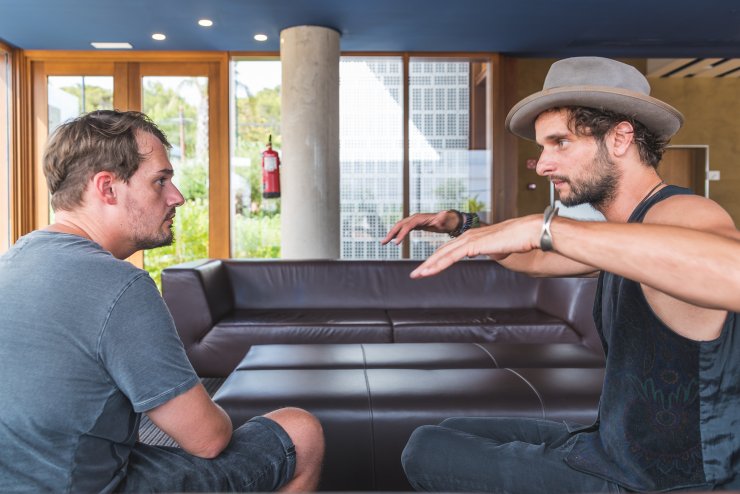
Satori isn't just a one-man show. Included in his portfolio is a full touring band of fellow musicians, eponymously called Satori & the band from space. We were curious how an experience with the band might differ from a solo set.
"I love to do a 04:00 live act where people close their eyes and move. But I also love to have a performance where people watch and look towards the performance, without feeling the need to react.
There's no preferred option, but with the band I can touch a lot of ground that I can't with my live act. Both share similar traits: both are live and both are improvised."

Hinting perhaps at a slower tempo, it begs the question whether there is any overlap. Are tracks we hear in the club reinterpreted with the band?
"Some elements that I record can't be played by an instrument. What we found interesting was saying to the guitar player: 'You need to fill in this part with your guitar.' So he needs to find a way to deliver that element with the same intensity and vibe.
In some cases, it was really hard to instrumentalise my electronic productions. But for me, that was the most beautiful part of this project. Elements that my fans are used to hearing in one style would suddenly be interpreted by a guitar.
You can see people go 'oh fuck, man, he's playing that element. How cool is that?' It makes the music come alive in a different way.
I have this cool idea in my head, that my fans need to go to Satori & The Band From Outer Space at 20:00 and then later in the night head to my 02:00 live act. Same tracks, but different experience: two worlds."
The Dance Floor Reimagined
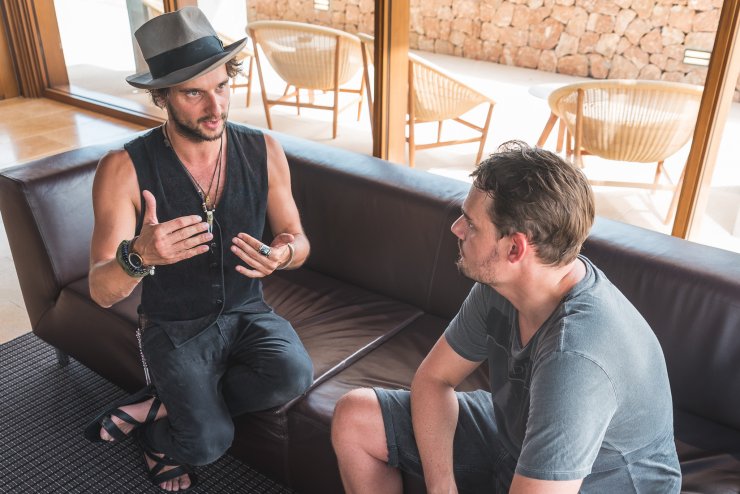
Satori has been kept exceptionally busy this summer on Ibiza. Not only has he been a pivotal creative force behind Guy Laliberté's HEART concept, but also he has starred as one of the marquee acts at DYSTOPIA.
Another notable appearance came for The Storytellers at the start of August. Satori closed the outdoor stage during its inaugural venture on the island at Cova Santa.
If there's one theme that strings these three parties together, it's the peripheral entertainment that accompanies the music. Surely it's no coincidence that Satori picks his parties accordingly?
"I think if you if you look to club performance - regardless of the discipline - it has always been supported by extra production, whether that be podium dancers or the light show.
I believe what I'm doing is a real performance. I work my ass off on stage! If that is supported by theatrical acts, I think it makes the whole product stronger. It makes the experience come alive more.
But there's a trap. The trap is that the production doesn't have anything to do with the music. You see that sometimes, but you see don't see it at DYSTOPIA. You also don't see it at HEART either. I like that: to blend together in a wonderful synchronic way is magic.
Sometimes you get invited to play somewhere and you realise that they have copied this performance because they saw it at WooMooN. That's when it becomes a bit of a gimmick. But when it's done right, then it makes the whole experience superior.
I played for Storytellers a few times and they know my music. So I trust what they do. I trust that it's a good match.
When done right, the whole show becomes a bit more cinematic. If you look at cinema, there are actors, so it is a performance art. There is a visual element and then there's a soundtrack. It's a combination of those three disciplines.
That's why I like movies. For me, directors are the top artists in the world. They're like super humans because they think about the full product from the acting to the music, and they pull it all together. That's the highest art form in the world.
With Storytellers, HEART and DYSTOPIA, it becomes a cinematic experience for the audience."

"With DYSTOPIA it's actually very brave that Ushuaïa chose to bring this sound to a larger audience.
Normally I and some of the guys who play this type of music - the more organic, lower BPM stuff - do it at HEART, at WooMooN and a few other places. But Ushuaïa is a 10,000 capacity venue - super-massive.
It's a cool thing that they decided to bring this sound to an audience this size. I like that and the fact that many people in attendance might be a bit out of their comfort zone. It's not like this weird crazy music is inaccessible because it has become very popular now.
This music is growing in popularity every day. We all believe it's the future of electronic music - more live performances, more performing arts - getting away a little from the traditional DJing element."
The Esoteric Showman
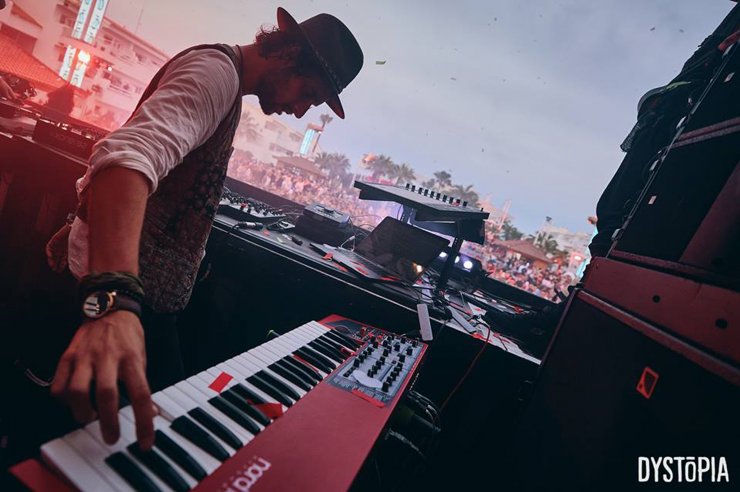
Whilst parties such as Cocoon and Afterlife have long been promoting the art of the live electronic music artist on Ibiza, it's fair to say it is still a misunderstood discipline - even on an island with a thriving scene like Ibiza.
The parties that Satori is involved with have shone further light on this skill set, yet the man himself is pragmatic about the ignorance that surrounds it.
"I guess it comes down to education, especially where Ibiza is concerned. People are on holiday and just want to have a good time. So they are likely to just be closing their eyes and enjoying the music instead of checking out what is going on."
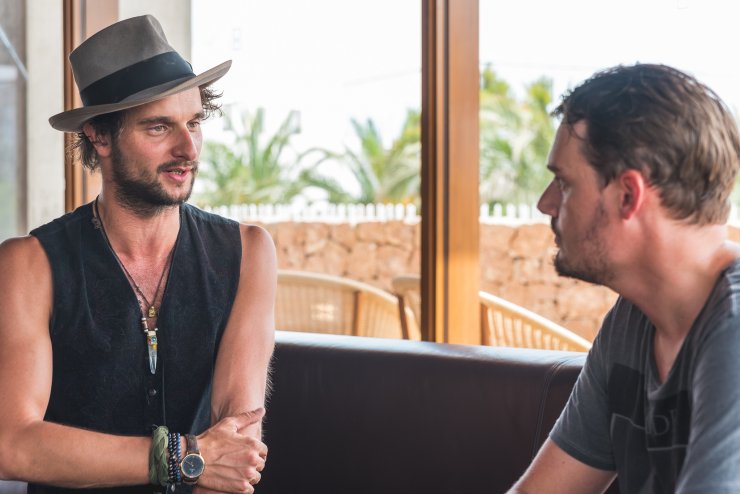
It seems even Satori's nearest and dearest sometimes have difficulty getting their head around what he does for a living.
"My mother kept saying 'he's a DJ' when speaking to her friends. Once I had a gig in Germany and my parents came to pick me up from Berlin airport. I promised that if they picked me up, I'd take them for a meal.
We were sitting at the table at this highway restaurant and then my mum asked me: 'How was your DJ set?' I said, 'I don't DJ'. She said she didn't understand what the difference was. She had tried explaining to her friends but wasn't sure.
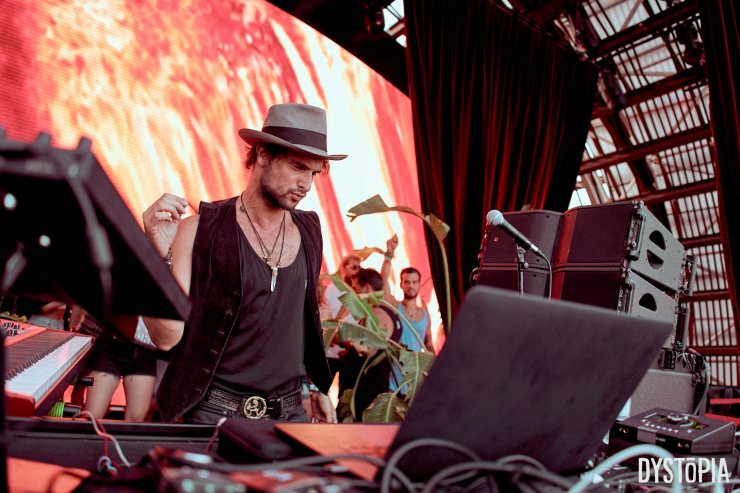
I had all my stuff with me, so I said, 'You know what Mum, I'm going to play for you.' We had this dinner table and I pulled out all my midi control controllers, my laptop, the synthesizers - I put all my gear on the table in that restaurant and passed her my headphones.
Then I started improvising live and I gave her like a mini solo concert for five minutes. I told her 'I'm improvising now. It's not a pre-programmed track. I'm playing. You know, check out this element I'm combining it with that element and I can decide to play keys or I can decide to play flute now. Each element that I bring in will give a totally different experience to that track.'
So I was doing that in that restaurant live for her, and she really liked it. She loved it, but in a way, she still doesn't get it."
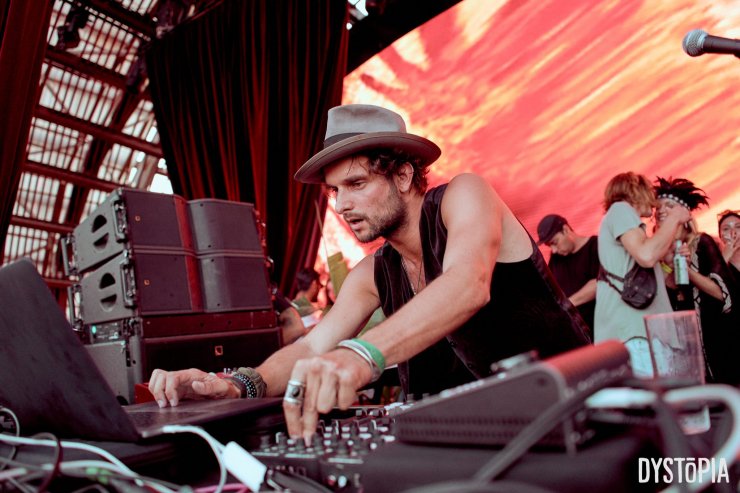
"On stage, I do this completely improvised live act but still some people think it's a DJ set. They just don't know. They will say things like, 'You're my favorite DJ' although I've not DJed in years. People are simply not aware.
It doesn't mean I don't appreciate if they say it. But what I noticed is that if you put a guitarist on stage, if you put a singer on stage, if you put a cello player on stage, people stand still and look to the performers. They take notice.
They didn't feel the need to go 'wow' and crazy on the dance floor. They just stand up for it. So with the band, I started to understand that when you see someone on stage working with real instruments, the crowd connects with it in a different way."
Music aside, Satori is an artist unafraid to express himself on stage. His theatrical persona certainly gives the audience something to look at. His high-octane display creates energy that transfers to the dance floor. Is it all a part of "the show"?
"For me, it comes naturally. If you don't see me move, I'm not having a good time. When I'm in the studio making music, I behave the same way I do on stage. I'm standing a lot in the studio and I like dancing.
I respond very physically to the music, but in the studio, I'm all alone. So it's really natural. On stage, it's the same thing. I never think about it, but if I don't move, you know I'm not having a good time.
If I move, I move. If I jump, I jump. I like to have things come naturally otherwise it's too programmed - it becomes too plastic, too forced."
It feels like we've arrived back at the beginning; back to the organic authenticity that embodies one of electronic music's most exuberant personalities. We have come to a perfect juncture on which to end our chat.
Our interview may have drawn to a natural conclusion, but the evening is still young and the fervent suggestion of anticipation hangs in the air. This is Ibiza after all. There's nothing else for it, it's off to Ushuaïa to watch Satori hypnotise the crowd at DYSTOPIA.
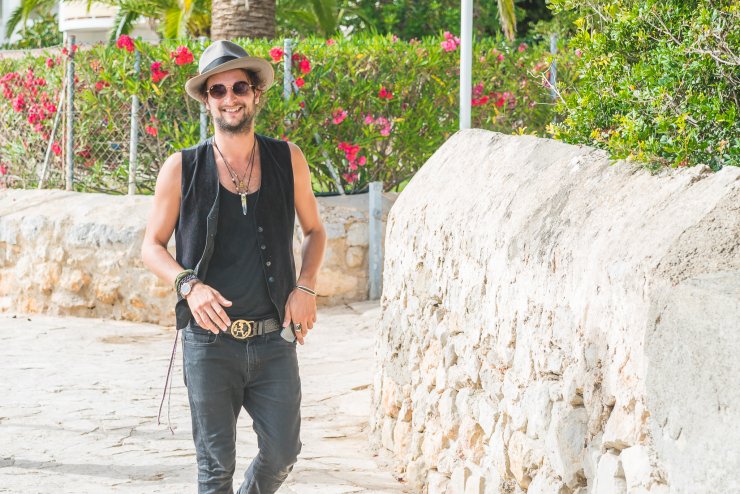
Satori's final confirmed appearance at DYSTOPIA takes place on Friday 24 August alongside Luciano and DJ Koze. Please see below for full event listing and those precious tickets.
You can also see him playing at HEART for Bedouin Presents Saga on 9 September. Stay tuned for an exciting new project fronted and devised by Satori coming soon.
